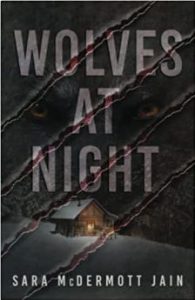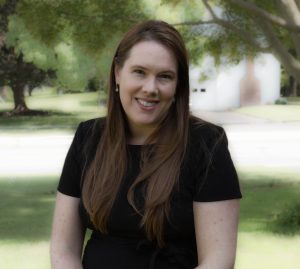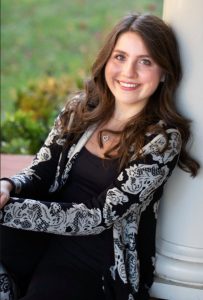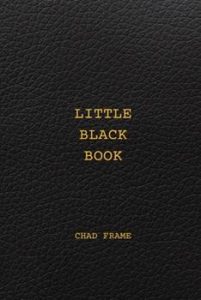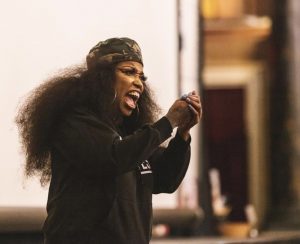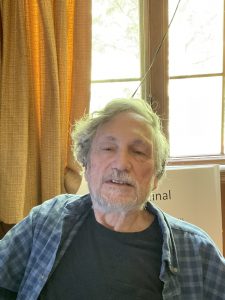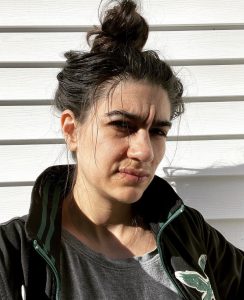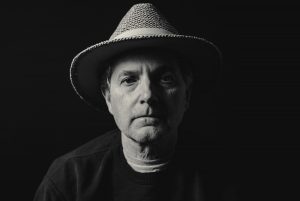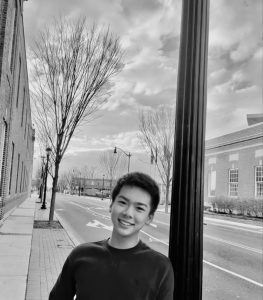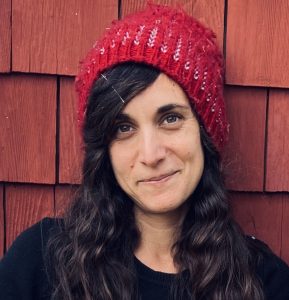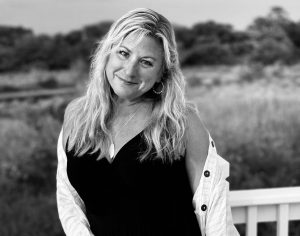
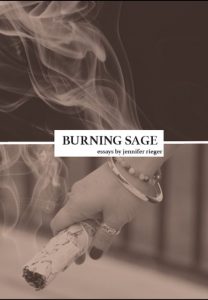
Jennifer Rieger is a public educator and college professor in the Philadelphia area. An advocate for her students and graduates, she dedicates her time to empowering others through reading, writing, and acts of love. Jen has been honored with the Franklin Institute 2020 Excellence in Teaching Award, the 2021 Philadelphia Phillies All-Star Teaching Award, and was a semi-finalist for the Pennsylvania Department of Education Teacher of the Year. Along with a nomination for the 2020 Pushcart Prize for Literature, she’s also been published in Chautauqua Literary Journal, Wisconsin Review, BUST Magazine, Philadelphia Stories 15th Anniversary Anthology, among others. Jen holds an MA in English Literature, an MFA in Creative Writing, and spends her free time bragging about her son, students, and thousands of graduates.
Social Media:
Instagram/Twitter: @MsJRiegs
Website:
www.HerVerse.org
To purchase:
Minerva Rising
Amazon
Curtis Smith: Congratulations on Burning Sage. I really enjoyed these essays. Can you tell us about the book’s journey and how you ended up working with Minerva Rising?
Jennifer Rieger: Thank you so much for the opportunity! I would say that the Genesis point of the book was with an essay called “The Meantime.” I had not been in my MFA program for long, and to be quite honest, I started the MFA as more of a pastime. My son had just left for college, and there I was, this 38-year-old empty-nester wondering what was in store and if I could use some of my newfound freedom to revisit, as Cheryl Strayed calls it, the “ghostship” that drifted away eighteen years before. I desperately wanted to be a writer when I was younger, but as a young mom, teaching seemed to be the more stable path. Two decades and a Masters in Literature later, and I was sitting in this MFA Creative Nonfiction Workshop class with Anne Kaier writing about stigma, and those two decades of studies, and teaching, and motherhood just poured out of me. I had never written anything of substance in such a frenzy before. That first piece was called “The Meantime”—because that’s what all of those years felt like. Who knew that little essay would get published and start a brand new journey for me. Little by little, I started connecting and crafting those years in journals, during weekends, holidays, summer breaks. What started out as a manuscript called The Meantime transformed into Burning Sage and became my MFA thesis, and I submitted it to Minerva Rising when they publicized their memoir contest. The rest has been a whirlwind of decision making, editing, pandemic delays, imposter syndrome—you name it.
CS: Was it always creative nonfiction first for you? Or did you start your creative work in fiction and then find yourself drawn to CNF? Do you find writing both fiction and CNF helpful? How would you compare their toolboxes? Their processes?
JR: I actually started the MFA as a poet. It didn’t take me very long of workshopping peer pieces in my cohort to realize I was severely out of my league. (Laughs) Everything I wrote turned into these prose poems that grew longer and longer. The charade had to end. However, with that, this lovely sense of self-actualization resonated—I did indeed have a story to tell. I just had to finally give myself the space and freedom to admit that mine was worth telling. I was also grateful for those poetry workshops and continued to take them. My prose grew sharper, more lyrical. My favorite poet is Sylvia Plath, and I’m drawn to her poetry much more than her prose; however, I teach her novel The Bell Jar and each time I read it, I am in awe of how cadence and melody slips into each scene, each description. (What I would give!) So, I try. I dabble. With each poem I write, I ask myself, what is the story behind this? What is deep inside of me that I’m veiling in metaphor? How can I rip off the bandage and dig into the story? It’s scary. And it’s beautiful. Having said that, there are things in life that I find much too painful for prose—some things that I’m not yet ready to bring to the world of storytelling. And that’s when poetry is there for me.
CS: I’ve been talking to my students recently about access points and how we initially find our way into our holidays and summer vacations pieces. Did you have a go-to access point in these—memory, concepts, images? Or was each piece its own journey?
JR: Curt, I just wrote. (Laughs) At first, anyway. Every spare moment I had, in the creative writing class I teach at Upper Merion or when gridlock turned the Schuylkill into a parking lot, I bled into my journal. But after awhile I started seeing these patterns. When I wrote about the strong women in my life (typically my grandmothers) they would invariably match up with student stories that stuck with me. In the early part of my MFA, I just tried to get the stories down to see where the writing took me. After some workshops with CNF writers like Jillian Sullivan and Kristina Moriconi, I began honing in on images—a mink coat, a bundle of sage, a spot of blood—and I let the image propel me forward. There’s piece in my book called “The Fix” that started out as a story of a fairly introverted boy who used to sit in this tattered, old blue upholstered office chair in my classroom and share joys, fears, anxieties, past hardships—everything in need of purging from a high school senior’s mind. It was a sweet story of our unlikely little friendship; but his wasn’t the only story that chair held, and he wasn’t the only student to give me purpose. I expanded the piece to what I had buried deep down, to what the blue chair represented, to why those kids were such a “fix.” I cried the whole time I wrote the first edition, and the whole time I transformed it thinking about all the different definitions of the word fix and how I fit into each one.
CS: We first met at Rosemont’s MFA program. Deciding whether or not to pursue a MFA is a decision many writers face. What did getting a MFA do for you as a writer? What advice would you offer anyone who is considering attending Rosemont or another MFA program?
JR: I know there’s a lot of controversy as to whether writers need an MFA. I get it. But every writer is different. Personally, I would not have sharpened my skills, learned the rules of getting published, participated in public readings, or had any kind of writing network had it not been for my cohort at Rosemont. There’s an accountability and comradery that comes with the right MFA program. Carla Spataro, the director of the program, has been able to create this kind of environment, and I’d still be scribbling in my journal without it. My advice? Do some soul searching and some research. Are you self-driven? Do you have time in your schedule to actually be self-driven? I find life to be mentally exhausting and needed an instructor assigning work to me and giving me feedback. Some might not need that.
CS: I have two questions about structure. The book is divided into five themed sections. Was this idea with you from the start? Or did you find yourself with separate pieces and then discover these currents in them? What do you think this organization brings to the book? And second, a number of the essays begin with an epigraph of one form or another. At what point in the process did these come into play? Were some part of an essay’s origins? Or did you find yourself discovering what the piece was about as you wrote and then finding an epigraph that fit? What role do you think these epigraphs play for the reader?
JR: By the time I wrote the title piece for the book I started to see and understand, like a sage plant, my own growth process that brought me to that place. The story of “Burning Sage” brought me to that reckoning—it’s letting go of three students who showed up in my class at just the right time, at the peak of my career. My son was in college at that point, I became Department Chair, felt confident teaching my Advanced Placement course, and I was writing again after two decades of fragmented thoughts. I knew then it was my peak, my own personal blooming, and I still know that now. The story examines that cusp in life—that jumping point—and how we handle it. I’m not sad about it anymore, because like the sage, I was taken from Bloom to Burn. It was and still is a new place for me to lay bare everything I learned and use it to the best of my abilities. Don’t get me wrong though, I don’t confuse this place with some kind of personal teaching Nirvana. I might have the experience of a veteran teacher and the wherewithal to be assertive in life, but I make mistakes on the daily and have a great deal more to learn. I love that. My kids teach me that every day.
Concerning the epigraphs, those didn’t come into play until the very end. I’ve been fascinated by Medieval mystics and visionaries for most of my adult life. I was researching some of the writings of Hildegard of Bingham, and interestingly enough for an 11th century nun, she loved to study infection, psychology, and human sexuality and explore natural remedies for both minor and severe ailments. I came across something she said about sage:
“Cur moriatur homo, cui salvia cresit in horto?
Why should a man die, whilst Sage grows
in his garden?
This not only became one of the two main epigraphs of the book, but also inspiration for further medicinal, spiritual, and historical study on this magical little plant. The more I learned, the more I understood how all these facts about sage could provide me with the access points I was seeking. And they made sense. There’s so much in nature that corresponds with the human condition. It’s amazing how often we either forget that or ignore it.
CS: As someone who taught high school for many years, I really enjoyed your essays about teaching. I think it can be a challenge for someone who edits or teaches writing to go home and then shift into creator/writer mode. Has this been a challenge for you? Or do you find inspiration in your work that carries over to your writing desk?
JR: It’s more of the latter, I think. To be quite honest, there was quite a bit of time when I thought I settled as a public educator. I had essentially given up on my dream because I chose to have my son at 19, and I thought teaching was the perfect career for mothers. (What a cruel myth!) But I look back at that girl wondering if circumstances were different, what would she even write about? Don’t be mistaken, I know there are many young writers out there with an expansive world view and lives rich in stories. I just wasn’t one of them. Having my son, and in turn, becoming a high school teacher, have been the greatest blessings of my life. They’re the ones who taught me what love, compassion, and sacrifice really are. And in each piece I write, I’m writing a love letter to them. So really, I’m not a writer who teaches. I never have been. I’m a teacher who, because of these kids, happened to find her voice.
CS: I felt like many of the pieces had you considering the world from your different roles—daughter, granddaughter, wife, mother, teacher—and all these perspectives gave the book a kind of cohesiveness, almost like it was more a memoir than a collection of essays. Did this ever come to mind as you were putting the manuscript together?
JR: I think part of what creates the “unconventional” in the subtitle of the book is that all of these identities blur. We don’t have to be constrained to little compartmentalized boxes. Society has blurred lines by putting greater expectations on everyone, so how can we possibly live inside such confinement? I was a daughter to my grandmother, a sister to my son, a student to strangers, a granddaughter to my professor, a mom, aunt, sister, counselor, social worker to my students—these roles blend because life has become exceedingly complicated… and these essays blend too. This was not at the forefront of my mind while writing it, but now, I see it. I think this whole beautiful and aggravating project of mine became a quest for an answer. Who the hell am I? And while I’m all of those identities, I know the real answer. I’m a teacher—a teacher who accidentally and begrudgingly fell in love with this frustrating job that I was supposed to have all along. A teacher who desperately wants to exist in a magical world of reliving the most beautiful and meaningful parts of life twice. But since she’s not magic, she has to settle for writing about them instead.
CS: What’s next?
JR: More of this journey, Curt. I’ll teach until they peel me off the floor.
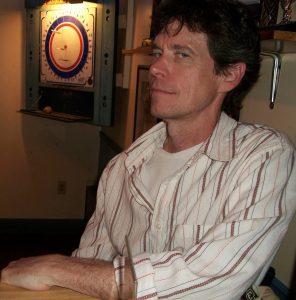
Curtis Smith’s last novel, The Magpie’s Return, was named one of Kirkus Review’s best Indie Picks of 2020. His next novel, The Lost and the Blind, will be released in late spring 2023.
